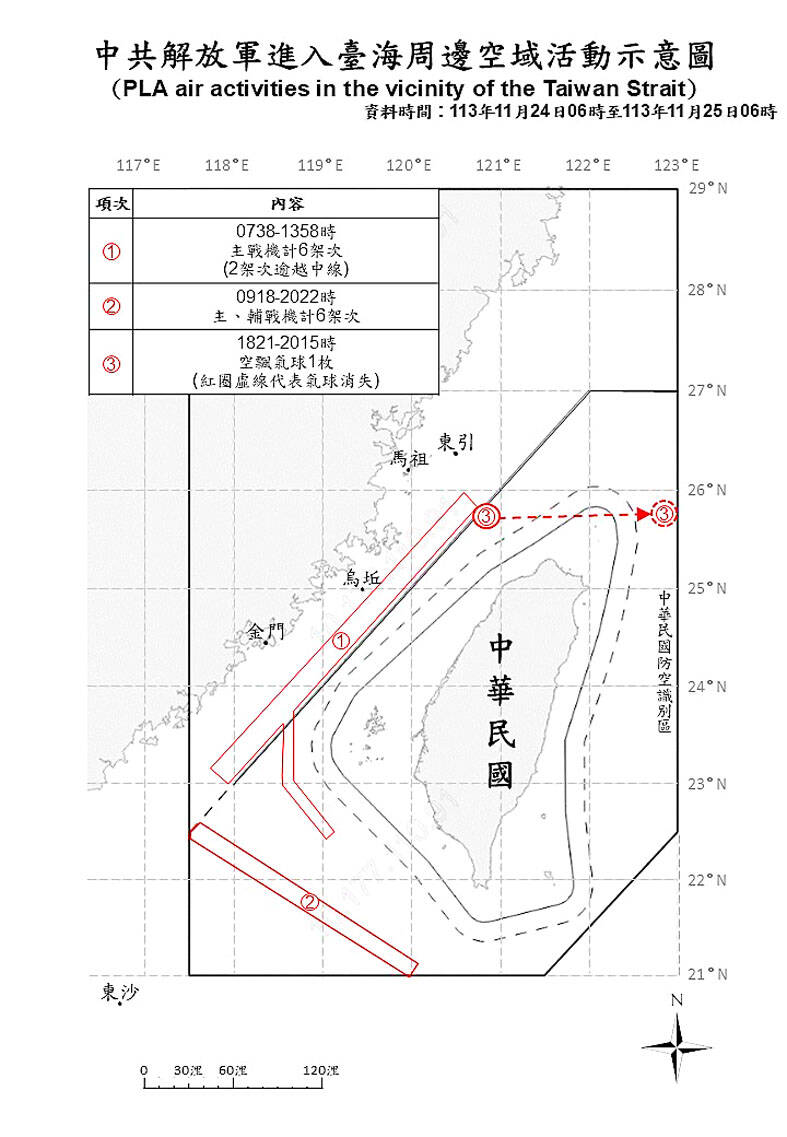The US is drawing up contingency plans for military deployments in Japan and the Philippines in case of a Taiwan emergency, Japan’s Kyodo news agency reported.
They would be incorporated in a first joint operation plan to be formulated in December, Kyodo reported late on Sunday, citing sources familiar with Japan-US relations.
A US Marine Corps regiment that possesses High Mobility Artillery Rocket Systems — a light multiple rocket launcher — would be deployed along the Nansei Island chain stretching from Kyushu to Yonaguni near Taiwan, Kyodo said.

Photo courtesy of the Ministry of National Defense
According to US military guidelines for dispatching marines in small formations to several locations, if a Taiwan contingency becomes imminent, temporary bases would be set up on inhabited islands, the report added.
Japan’s military is expected to mainly provide logistical support for the US marine unit, including supplying fuel and ammunition, it said.
The US Army would also deploy Multi-Domain Task Force long-range fire units in the Philippines, Kyodo said.
The defense ministries of Japan and the Philippines were not immediately available for comment. The US embassy in Manila declined to comment.
Asked about the report yesterday, the Chinese Ministry of Foreign Affairs said that Taiwan is an “inalienable part of China’s territory.”
“China firmly opposes relevant countries using the Taiwan issue as an excuse to strengthen regional military deployment, provoke tension and confrontation, and damage regional peace and stability,” Chinese Ministry of Foreign Affairs spokeswoman Mao Ning (毛寧) said.
China is building up its military capacity while ramping up pressure on Taiwan. Meanwhile, Washington has been strengthening alliances in the region and infuriating Beijing with regular deployments of ships and fighter jets in the Taiwan Strait and the South China Sea.
In other developments, Taiwan yesterday said it had detected a Chinese balloon over waters northwest of the nation, the first such sighting since April.
China regularly deploys fighter jets, drones and warships around Taiwan, and occasionally balloons, as it keeps up military pressure. The latest balloon was spotted at 6:21pm on Sunday, about 111km northwest of Keelung at an altitude of 10,058m, the Ministry of National Defense said.
It entered Taiwan’s air defense identification zone and disappeared at 8:15pm, the ministry said.
Twelve Chinese military aircraft and seven warships were also detected around the nation in the 24 hours to 6am yesterday, it added.
The ministry releases daily data on China’s military presence around Taiwan.
In the run-up to the January presidential election, balloons crossed the sensitive waters separating Taiwan and China day and night, with some floating above the nation. Taipei has described the balloons as a form of “gray zone” harassment — a tactic that falls short of an act of war.
China has previously brushed off allegations that it sends balloons over Taiwan, accusing Taipei of trying to raise tensions.
Asked about the balloon yesterday, Mao told reporters: “First of all, Taiwan does not have a ‘defense ministry.’ Furthermore, the question you asked is not a diplomatic one.”
Balloons from China became a politically fraught topic early last year when the US shot down what it called a spy balloon. The huge balloon, which carried a large payload of electronics, flew over sensitive US military installations and prompted concerns Beijing was scooping up vital intelligence.
Beijing has said it was a civilian airship blown off-course.

Alain Robert, known as the "French Spider-Man," praised Alex Honnold as exceptionally well-prepared after the US climber completed a free solo ascent of Taipei 101 yesterday. Robert said Honnold's ascent of the 508m-tall skyscraper in just more than one-and-a-half hours without using safety ropes or equipment was a remarkable achievement. "This is my life," he said in an interview conducted in French, adding that he liked the feeling of being "on the edge of danger." The 63-year-old Frenchman climbed Taipei 101 using ropes in December 2004, taking about four hours to reach the top. On a one-to-10 scale of difficulty, Robert said Taipei 101

Nipah virus infection is to be officially listed as a category 5 notifiable infectious disease in Taiwan in March, while clinical treatment guidelines are being formulated, the Centers for Disease Control (CDC) said yesterday. With Nipah infections being reported in other countries and considering its relatively high fatality rate, the centers on Jan. 16 announced that it would be listed as a notifiable infectious disease to bolster the nation’s systematic early warning system and increase public awareness, the CDC said. Bangladesh reported four fatal cases last year in separate districts, with three linked to raw date palm sap consumption, CDC Epidemic Intelligence

US climber Alex Honnold left Taiwan this morning a day after completing a free-solo ascent of Taipei 101, a feat that drew cheers from onlookers and gained widespread international attention. Honnold yesterday scaled the 101-story skyscraper without a rope or safety harness. The climb — the highest urban free-solo ascent ever attempted — took just more than 90 minutes and was streamed live on Netflix. It was covered by major international news outlets including CNN, the New York Times, the Guardian and the Wall Street Journal. As Honnold prepared to leave Taiwan today, he attracted a crowd when he and his wife, Sanni,

Taiwanese and US defense groups are collaborating to introduce deployable, semi-autonomous manufacturing systems for drones and components in a boost to the nation’s supply chain resilience. Taiwan’s G-Tech Optroelectronics Corp subsidiary GTOC and the US’ Aerkomm Inc on Friday announced an agreement with fellow US-based Firestorm Lab to adopt the latter’s xCell, a technology featuring 3D printers fitted in 6.1m container units. The systems enable aerial platforms and parts to be produced in high volumes from dispersed nodes capable of rapid redeployment, to minimize the risk of enemy strikes and to meet field requirements, they said. Firestorm chief technology officer Ian Muceus said